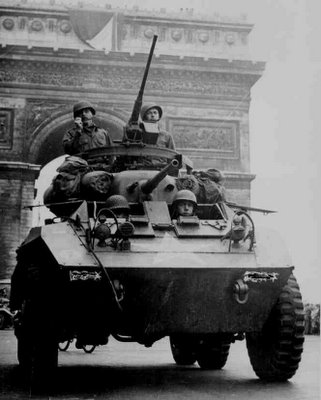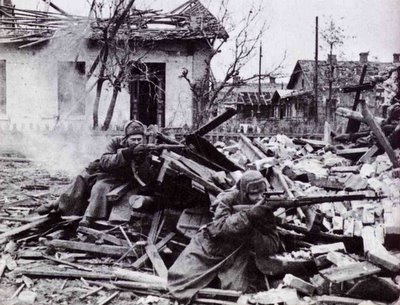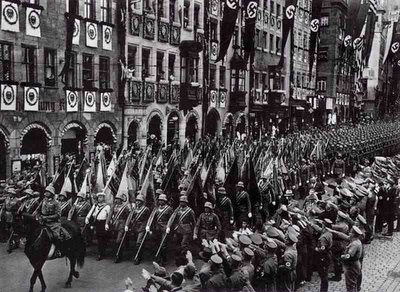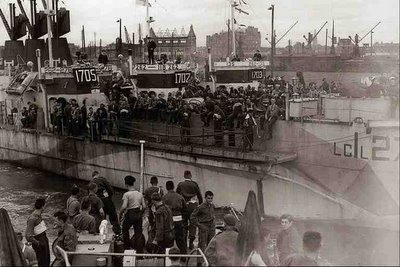
More of The World At War. The producers have on several occasions played a jaunty song of the times, usually a woman singing, under a pastiche of still photos and video, often of quite terrible or devastating scenes. The effect is nostalgic and heartbreaking.

After the failure of the Germans at Stalingrad--twice--there was a sick sense of fatalism that passed through the population about how their government had overreached and a devastating defeat was now inevitable, a defeat where just a few short months before a glorious victory had been ensured. The footage shows a beaten population in the still-functioning cinemas in 1943 and 1944, trying to get some little bit of escapism before the axe finally fell. The camera pans over dirty, exhausted faces struggling to lose themselves in the fantasy on the screen--dirty children and elderly people in threadbare clothes and maimed soldiers trying to mend. Such a comedown from the euphoria that swept the country after the fall of France in 1940, from the sense of exultation that the "wrongs" (as they were seen) of Versailles were revenged, from the days when Hitler had proven to a downtrodden people that they really were something above other nations.

Such a story. And the more fascinating and moving because (the convictions of Iranian President Mahmoud Ahmadinejad notwithstanding) it actually happened. Truth really is stranger than fiction.
P.S. In searching for a good picture of Stalingrad for this little post I came across this site, which provided these photos and has many others, if you're interested in this sort of thing.

12 comments:
Thank goodness Hitler didn't study his history too much or he would have learned from Napoleon's mistakes with Russia and a two-front war.
You certainly had a lot to say today. :-)
This is actually a couple days' stuff, but yeah, I'm windy. Funny how sometimes you can't write for beans and other times the stuff comes out unbidden. Honestly, I've felt a bit dry lately, and yet I've posted a hell of a lot of stuff. Ah well, quantity if not quality!!
What must it have been like to be German during that time? In a way, it must have seemed like the end of the world. I've always wondered how Germans reconcile themselves to that time now. In particular, I wonder how that era is taught in schools? What do little German kids learn about WW2? In American schools it's so black and white - the ultimate good triumphs over evil story. I'd love to see a German history textbook on it.
p.s. "quantity if not quality" - stop talking about me ;-)
I wonder about this all the time, about how different the world can be spun to look. I always hasten to add that I am not one shred sympathetic to Nazi ideals, but their whole use of propaganda and symbology and ritual is fascinating. And it clearly succeeded in setting a stage that was bought into by a huge number of intelligent and very educated people.
But that's what makes the downfall so fascinating. The conquests of the Sudetenland and the Rhineland, of Czechoslovakia and Austria, and even thru Poland and France--these facts could be twisted to SEEM rational and just. But each new conquest required a bigger and bigger stretch, and like a marriage gone bad, German citizens must have awakened one morning and realized that they had been accepting and overlooking things which, it now seemed clear, actually needed to count heavily against them.
And Stalingrad was the point at which it seems the great tide of Germans realized that they were fucked. Not just as an army, but their culture was deep into a mire and they had let Hitler put them there.
Ah, I can go on and on and on. (Somebody STOP me!)
Ah, but I can't stop. I've just finished coverage of the occupation of Holland, and the systematic, brutal treatment of the Jews--the single most horrific legacy of the Nazis; so unspeakable when one looks it in the eye that it overshadows everything else--sucks the very life out of one. Horror. Such horror.
Great pictures! One really fascinating book about the Holocaust is "The War Against the Jews", by Lucy Davidowicz (sp?) - not sure if it's still in print, but it's highly readable. I haven't made it down to the Holocaust museum in DC (despite living fairly close), but I've heard it's just an emotionally draining experience - which isn't to say that it's not something worth experiencing. I've always found that whole era to be fascinating, both WWI and WWII. To think of how the entire world could look different today if just one battle had gone the other way, one code hadn't been broken, etc. Crazy. Looking at the life and times, as it were, of Stalin is also fascinating - talk about a monster.
One of my favorite comedians, Eddie Izzard, when talking about WWII (he's a huge history buff) said re: the two-front war:
"Clearly Hitler never played 'Risk' when he was a kid. Everyone knows you could never hold onto Asia..."
It is a huge painful subject for the Germans from what I can tell from living there. Something they strive to redeem themselves from but not knowing if they ever can. I guess the only thing that can compare in this country is the issue of slavery and racism in the South.
I've read a bit about Stalin, and that's a whole 'nother can of worms. But it's maybe less well known because the country was so secretive and backward. The Nazis were secretive enough, but still much of their doings played out on the center stage of Western culture. The Soviet Union was a closed shop.
The analogy of Slavery seems quite apt. I don't think most Americans are burdened (in a day-to-day sense) with the guilt or onus of slavery; it is quite distant for my generation. But it is a part of our history and something we must come to grips with in that the underlying causes remain in us as individuals and as a culture. (I suspect an African-American would say it's not nearly so far behind us as I'm implying.)
And so must it be with the Germans, except that here it is in relatively modern times. Some of these people are still alive, and this history can't be blamed on a different time or on different sensibilities or expectations. (That's exactly why my documentary is so fascinating.)
Our German Exchange student and I had several conversations about just this.
Certainly, most people feel aweful about what happened. BUt what they are being taught in schools likens itself a lot to what we are taught about our leaders. That is not to say that they revere him, the way we do JFK (falsely, I might add), but they certainly are taught a more "rose colored" version than we are.
Robert (that was our GXS) had the luxury of learning our world history in classes while he was here, and it did not compare to what he was taught. (go figure)
I will email him and get him to supply some quotes.
I have a Franco-era Spanish history textbook from Spain. World events were spun a bit differently in it than they were in textbooks I have from other countries. Not Iranian "Holocaust never happened" spun, but spun nonetheless, with several intriguing negative stereotypes of American culture thrown in.
I was 12 when I first read it. It was very odd and painful to realize somebody didn't love the USA and see the details of American culture misconstrued so convincingly.
And this, naturally, makes us wonder how spun OUR history is. My skepticism rears its ugly head(s).
And in that vein I wonder too what Russian textbooks now say about that period, about Lenin, about Stalin, about the US, etc. And were they completely rewritten after the fall of the USSR?
My documentary is British, and it focuses on the British & American view of things. The Russian stories are as varied and moreso, and as fraught with heroism and devilry. But the documentary covers the Soviet side of the war in passing almost.
Post a Comment